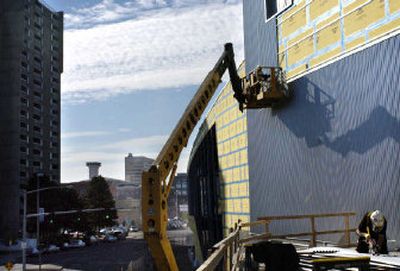Audit: PFD worth price

Between its in-house employees and contracted services, the Spokane Public Facilities District — which owns and operates the Arena, Convention Center and Opera House — spends about $1 million more on staffing annually than average comparable organizations nationwide.
The district’s maintenance costs are high as well, reaching $1 million for the three buildings in 2004.
However, event attendees also report a high degree of satisfaction with the staff and the events.
Those are some of the findings of an audit conducted on the district’s operations, ordered by its board of directors. In general, the auditors did not find cause for concern, but did recommend the district research some ways to save money or earn more.
“There’s nothing earth-shattering,” said Brian Parker, project manager for Conventions, Sports and Leisure International of Minnesota, which conducted the $75,000, months-long audit. “There’s nothing here that says, ‘Wow. This needs to be fixed, today.’ There are areas that can be researched further and understood further, like staffing. Is this the best way to do it? Let’s re-evaluate and see what makes sense.”
Parker said the district’s contracts with service providers — including food and beverage, maintenance, security and ticketing — all are in line with industry standards. That was good news for board members, who said they ordered the audit to make sure the district’s operations were solid.
“We knew our staff and operations were good, and having an outside objective firm confirm that is very empowering to us because we can look at you and say, ‘We’re doing well. Our staff is doing well,’” board member Mick McDowell said. The board was pleased that the audit resulted in relatively few recommendations for improvement.
PFD Executive Director Kevin Twohig said the district’s success results in higher expenses. Profits from operating the buildings can only be spent on two things, he said: staff or maintenance. In 2004, the district generated a profit of about $1.3 million.
However, excluding $1 million in annual public support — including portions of a lodging tax, admissions tax on tickets and a contribution from the city of Spokane — the district operated at a loss of about $365,000 in 2004. That was lower than the average loss of $610,000 experienced by other comparable complexes nationwide, the audit showed.
Though the Arena and the Opera House earn money, the Convention Center loses money, which the district knew when it took over control of the latter two facilities from the city of Spokane two years ago, Twohig said. The district and the city negotiated a contribution from the city in order to make up for that anticipated loss, he said.
Still, the district’s staff plans to research prices at the Convention Center, which have traditionally been kept low due to the competitive nature of the business, he said.
“The rent’s low, the equipment rentals are low, the staffing is low, everything’s low,” Twohig said. “This is compounding. Every event we do costs us more than we’re able to take in.”
Parker said that’s common in the convention center industry. He also said gross sales of food and beverages at the Arena are below industry averages and should be researched. Many factors could contribute to that, he and Twohig said, such as overpricing, underpricing or too few concession stands being open on event nights. Twohig said he’d also like to see additional credit card machines installed at concession stands. Sales can be lost if a customer has to wait longer than the intermission during a Spokane Chiefs hockey game, for example.
“We do experiments with those kinds of things,” Twohig said. “We’ve tried a lot of things.”